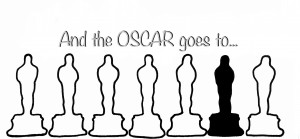Oscar nominations lack racial diversity
On Jan. 15, Academy Award nominations for various film achievements were announced. During these announcements, the staggering lack of diversity, particularly in the acting and directing categories, was apparent.
As the list of nominees was read, a big question mark was put on the Oscar, an award that supposedly recognizes people, regardless of their race, for the contributions they have made to the world of cinema. In a year that produced monumental films such as Selma, a biopic about Martin Luther King, Jr., the Academy’s neglect of color reveals that criticism of the awards is deserved and that there is a need for new membership in the Academy.
According to The Hollywood Reporter, this is the second time in nearly two decades that the 20 acting nominations went to a group of exclusively Caucasian actors and actresses. A similar nominee list occurred in 2011. Unfortunately, a homogenous group of people nominated for an Academy Award is not a new revelation, but it needs to be remedied.
The lack of diversity in nominations might have something to do with the Academy’s membership. The Atlantic states that out of the 6,000 voting members of the Academy, 94 percent are white, 76 percent are male, and the average age is 63.
This means that the membership might not reflect the critical acclaim of the year, leaving out a David Oyelowo for playing King in Selma or a Miyavi, who played a prison guard in Unbroken. Rather than plainly accept that Academy voters leave out actors who demonstrate great acting ability, audiences everywhere have to support actors of color and watch their movies to generate buzz, creating a conversation about why that particular film is essential. The Academy, in conjunction with audiences voicing their opinions, has to invite more than just white males into its demographic.
This Monday marked the annual celebration of Martin Luther King, Jr. Day. Even in the contemporary world, King’s “I Have a Dream” speech can leave anybody with goose bumps. The way King describes a dream, his dream of a world where equality exists with no place for bias, discrimination and injustice, was revolutionary for his time. But the recent Oscar nominations have done nothing to contribute to this dream and, instead, have taken this world a step back by exhibiting a lack of diversity at such a grand level. This started with the absence of Oyelowo from the acting nominations.
That Selma was ignored is significant but the issue is even bigger than that. The American film industry is often looked upon by other countries as the dominating force. It embodies a paradigm of morality, integrity and justice, all while producing the most cutting-edge material. Therefore, every action that the film industry in this country takes is likely to set an example and have an impact on almost all the other film industries in the world. A lack of judgment in choosing nominations for such a prestigious award represents more than just a careless mistake.
Some argue that this year’s Oscar nominations are nothing but a coincidence. As an article in The New York Times pointed out, one could assume that last year’s Best Picture winner, 12 Years a Slave, 2012 Best Picture nominee The Help and 2013 Best Picture nominee Django Unchained are examples of films embracing more of a diverse population.
In the last few years, however, examples of movies that celebrate race and document hardships that people of color have experienced stop there. So, more than anything, there needs to be a collective effort to get these stories out. More funding, especially, should be allocated to these film efforts.
The dream is for the Academy to recognize the actors that deserve an Oscar. The dream is for the Academy to represent more than what a 63-year-old white male deems best in show.

